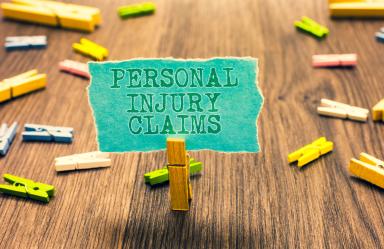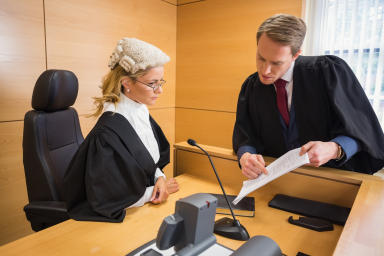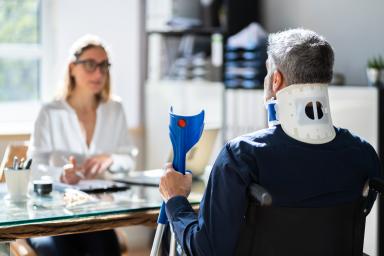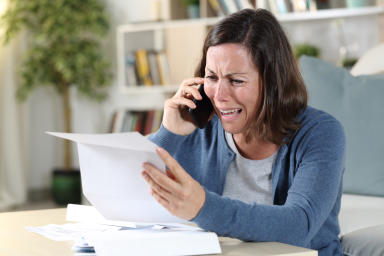South Carolina Personal Injury Laws

South Carolina is known for so many things, such as its warm temperature, recreational parks, and white sand beaches. However, the state’s renown is tainted by its poor ratings in three different studies — the Palmetto State lags behind when it comes to safety. In a 2022 research that ranked all 50 states in terms of safety, South Carolina placed 42nd. This result was relatively consistent with its 43rd safety ranking in a separate report provided by Consumer Affairs. Finally, a study conducted by a pair of personal injury lawyers showed that South Carolina has the fourth most personal injury cases per capita.
With that said, it comes as no surprise that South Carolina has intensified its efforts to implement its laws to protect its citizens and help those who have sustained injuries. This article will discuss the relevant laws that commonly come up in personal injury lawsuits, the factors that affect the amount of compensation a plaintiff may be awarded, and the deadlines for filing a claim depending on the unique circumstances of a case.
South Carolina Premises Liability Laws
In South Carolina, property owners may be held liable for injuries sustained by guests at their establishments. Slips and falls, amusement park and swimming pool accidents, inadequate building security, and toxic torts can all serve as grounds for a premises liability action. Residential properties are also covered by the law.
Plaintiffs pursuing a premises liability suit must be able to prove the following: the property owner owes them a duty of care; the duty of care has been breached by the property owner; and the said breach has caused their injuries.
The scope of duty of care owed by a property owner is determined based on the visitor’s classification at the time of their injury, namely:
Invitee. This refers to individuals granted permission to enter the premises for the property owner’s benefit. A customer in a grocery store is an example of an invitee.
Licensee. This refers to individuals permitted to enter the premises for their own enjoyment, comfort, or curiosity. Social visitors, like dinner guests, are included in this classification.
Trespasser. This classification applies to individuals who enter without the owner’s permission. This usually applies to private properties or venues closed to the general public.
Attractive Nuisance Doctrine
Unlike invitees and licensees, property owners are not liable for injuries sustained by trespassers. An exception to this rule is the attractive nuisance doctrine, which applies to child trespassers. The property owner can still be held liable if the following conditions are met:
The owner is responsible for a hazardous condition on the property.
The hazardous condition is considered attractive to children.
The injury sustained could have been preventable.
Examples of attractive nuisances include swimming pools, swing sets, and trampolines.
South Carolina Product Liability Laws
Under this South Carolina law, if a product has been proven to be faulty and disproportionately harmful, then its manufacturer or seller may be held accountable for any injuries or fatalities brought on by the product. Product liability claims can be based on either strict liability or negligence.
Some of the evidence used in supporting a product liability suit include the defective product, video footage from manufacturing factories, incident reports, and the guidelines used in product manufacturing. It can be filed against sellers entities that are involved in the creation and assembly of the product. Casual sellers, typically individuals who sell secondhand goods at garage sales, cannot be sued for product liability claims.
Defendants in a product liability suit may raise the following defenses:
The plaintiff has misused the product.
The plaintiff has performed a substantial modification to the product.
The danger that caused the injury can be considered common knowledge.
The product is manufactured in compliance with federal laws and regulations.
Medical Malpractice Laws in South Carolina
Medical malpractice in South Carolina is governed by S.C. Code § 15-79. It usually involves delayed diagnosis of a serious disease, surgical and anesthesia errors, improper medication prescription, injuries sustained during childbirth, and failure to warn a patient of known risks associated with a medical procedure.
There are two steps a victim must take before filing a medical malpractice lawsuit. First, a “Notice of Intent to File Suit” must be filed with the court and provided to all medical care providers who might get sued. An expert affidavit prepared by a certified medical practitioner must be submitted as well.
The affidavit must describe at least one instance of medical negligence committed by the medical care provider to be sued. Once these documents have been filed, both parties involved must participate in a mediation conference within 90 to 120 days after the date of filing.
Good Samaritan Laws
Under South Carolina’s S.C. Code § 15-1-310, anyone who provides good faith emergency care to a victim at the site of an accident or other emergency shall not be held responsible for any personal injury sustained as a result of providing the emergency care. This is applicable to bystanders who might provide first-aid measures at the scene of a car accident and similar cases.
Car Accident Laws in South Carolina
South Carolina is prone to car accidents. In fact, a study released in 2020 showed that out of the 20 most car accident-prone cities nationwide, seven were located in South Carolina, with four cities being part of the Greater Charleston Area. A more recent analysis of data collected in 2022 showed that road safety in the Palmetto State did not improve at all. To date, it remains one of the states with the most accident-prone drivers.
These findings were consistent with the details released in the 2021 Edition of the South Carolina Collision Fact Book, which revealed the following road statistics:
One traffic collision occurred every 3.6 minutes.
One injury collision occurred every 14.4 minutes.
One fatal collision occurred every 7.9 hours.
Car accident laws in South Carolina are governed by Title 56 of the S.C. Code of Laws. In the event that a collision has not been investigated by law enforcement, the driver of any vehicle involved in the accident must fill out and submit a Traffic Collision Report to the South Carolina Department of Motor Vehicles. This report must be submitted within 15 days after the car accident took place.
South Carolina follows an at-fault doctrine, which means anyone responsible for a car accident can be held financially liable for the losses sustained by the accident victims. It also follows a modified comparative negligence rule, which means that any compensation you may receive from your lawsuit will be reduced in proportion to the amount of fault you share for the accident. You cannot recover any damages if your degree of fault exceeds 51%.
Hit-and-Run Accidents
South Carolina laws mandate that any driver involved in a vehicular accident must immediately stop, and failure to do so comes with heavy penalties. The severity of the consequences depends on the extent of damage caused. Thus:
If someone sustains minimal body injuries, the hit-and-run may be considered a misdemeanor. It comes with a fine of $5,000 and up to one year of jail time.
If someone sustains severe body injuries, the hit-and-run may be considered a felony with a fine between $5,000 and $10,000 and up to 10 years of jail time.
If someone dies as a result of the hit-and-run, the responsible party may be charged with a felony that comes with a fine of up to $25,000 and up to 25 years of prison time.
DUI laws
South Carolina is a “zero tolerance” state, which means that individuals below the age of 21 who have been caught driving with a BAC greater than 0.02% will automatically have their license suspended for at least three months. Worth noting is that DUI victims are allowed to pursue punitive damages from the at-fault driver, even if their DUI charges have been dismissed.
Dog Attack Laws in South Carolina
Dog owners in South Carolina are subject to a strict-liability statute, which holds them liable for any injuries or losses sustained by individuals assaulted by their pets.
In other states, the “one-bite rule” exists, which means that the victim must prove that the owner is aware of the dog’s dangerous behavior because it has already bitten someone before. However, this is not the case in South Carolina, and victims of dog attacks do not need to show evidence that the owner knew or should have known that their dog had been exhibiting aggressive behavior prior to the attack.
The owner will be held responsible if the attack occurred in a public space or if the victim has permission to be in the place where the attack took place, such as on the owner’s private property.
Exceptions may only apply if the dog owner can prove that the attack was provoked by the injured party.
South Carolina Business Liability Insurance Requirements
In South Carolina, businesses with four or more employees are required to carry workers’ compensation insurance, regardless if the employees are part-time or full-time. This is meant to cover employees’ expenses in the event that they sustain an injury from a workplace accident. Employers are also required to pay unemployment insurance through state taxes.
Businesses should also have commercial auto insurance for their vehicles, if they own any. The minimum coverage requirements follow the 25/50/25 rule, which means that for bodily injuries, the policy should cover $25,000 per person, $50,000 per accident, and $25,000 in property damage liability per accident.
Truck companies pay higher premiums and must comply with the following coverage requirements:
$300,000 for trucks carrying household goods, provided they do not cross state lines and weigh less than 10,001 pounds.
$750,000 for general freight trucks.
$1,000,000 for oil carrier trucks.
$5,000,000 for trucks carrying hazardous materials.
The City of Charleston has its own set of insurance requirements for contractors working in the metro. They must have employer’s liability insurance and workers’ compensation and comply with the following limits:
Professional liability - $1,000,000 per claim and $1,000,000 aggregate limit with a $20,000 deductible.
Automobile liability - $1,000,000 combined single limit per accident for bodily injury and property damage.
Workers’ compensation - Statutory limits as required by state law, and $100,000 per accident in employer’s liability limits.
General liability - $1,000,000 combined single limit per occurrence for personal injury, bodily injury, and property damage, and $2,000,000 general aggregate limit.
How Much Can Someone Sue For an Injury in South Carolina?
Personal injury plaintiffs in South Carolina can recover three types of damages: economic, non-economic, and punitive. Economic damages include current and future medical expenses, lost wages and future earning capacity, and rehabilitation costs. There are no caps for these damages. Non-economic damages recompense victims for the non-monetary repercussions of the injury, such as pain and suffering, loss of enjoyment of life, and mental anguish. Punitive damages can only be recovered if there is evidence that the defendant’s conduct that led to the injury had been “willful, wanton, and reckless.” It is meant to deter similar future conduct and punish the defendant.
South Carolina does not cap non-economic damages in personal injury cases, with the exception of medical malpractice lawsuits. Each claimant can only recover $350,000, and the same value can be collected for each responsible healthcare provider if there is more than one liable party. However, the combined compensation from all liable parties must not exceed $1,050,000.
Punitive damages are capped at $500,000 or three times the amount of economic and non-economic damages combined, whichever is higher.
The Statute of Limitations in South Carolina
The statute of limitations for a personal injury claim in South Carolina against a non-governmental defendant is three years. If the claim is filed against a governmental defendant, the limit is only two years.
There are also circumstances where the injury is not immediately apparent or has been sustained due to long-term exposure. In these cases, South Carolina courts follow a six-year discovery rule. An exception to this rule applies to medical malpractice actions wherein surgical tools have been left inside the patient’s body. Under this circumstance, the victim must file a case within two years after the discovery date, regardless of the surgery date.
Victims who are minors can file a claim until their 19th birthday, even if the regular statute of limitations has already been exceeded, but another exception applies to medical malpractice suits. In this case, they have seven years to pursue legal action.
Finally, individuals who were not mentally well at the time of the accident have five years after the accident to file a case.
Legal Resources for Injured Folks in South Carolina
South Carolina Bar Foundation
Established in 1987, the South Carolina Bar Foundation is the sole statewide funding source for programs geared toward providing civil legal assistance. It has awarded more than $50 million to various law-related organizations since its foundation.
Legal Assistance for Seniors
Funded by the South Carolina Department on Aging, Legal Assistance for Seniors focuses its efforts on senior citizens residing in rural areas, seniors who belong to minorities, and seniors with limited English proficiency. The range of its legal services includes cases involving abuse, age discrimination, neglect, housing, and protective services.
Charleston Pro Bono Legal Services
Charleston Pro Bono offers free legal assistance to economically disadvantaged locals. It hosts direct service clinics throughout the year where eligible clients can connect with volunteer attorneys and request community documents such as wills and powers of attorney.
South Carolina Victim Assistance Network
The South Carolina Victim Assistance Network was established in 1985 in an effort to create a network of service providers that could better serve and protect crime victims. It coordinates efforts to boost the general public’s awareness of victim rights. The SCVAN helps personal injury victims whose lawsuits also coincide with criminal cases. Examples include hit-and-run, DUI, and drunken assault.
South Carolina Code of Laws
The South Carolina Legislative Council provides free public access to the 1976 South Carolina Code of Laws. It serves as a rich resource for those who want to do in-depth research on the laws that affect their personal injury case.
Expertise.com StaffAuthor
Step into the world of Expertise.com, your go-to hub for credible insights. We don't take accuracy lightly around here. Our squad of expert reviewers, each a maestro in their field, has given the green light to every single article you'll find. From rigorous fact-checking to meticulous evaluations of service providers, we've got it all covered. So feel free to dive in and explore. The information you'll uncover has been stamped with the seal of approval by our top-notch experts.

Robert F. GoingsReviewer
Robert F. Goings is a trial lawyer in South Carolina and founding attorney of Goings Law Firm, LLC. Robert has been recognized as one of the most outstanding trial attorneys in personal injury and wrongful death cases in South Carolina by the leading peer review publications and known for achieving large verdict at trial. He is a legal authority in South Carolina for auto collisions, truck accidents, premises liability, medical malpractice, and nursing home neglect cases. Visit: www.goingslawfirm.com




